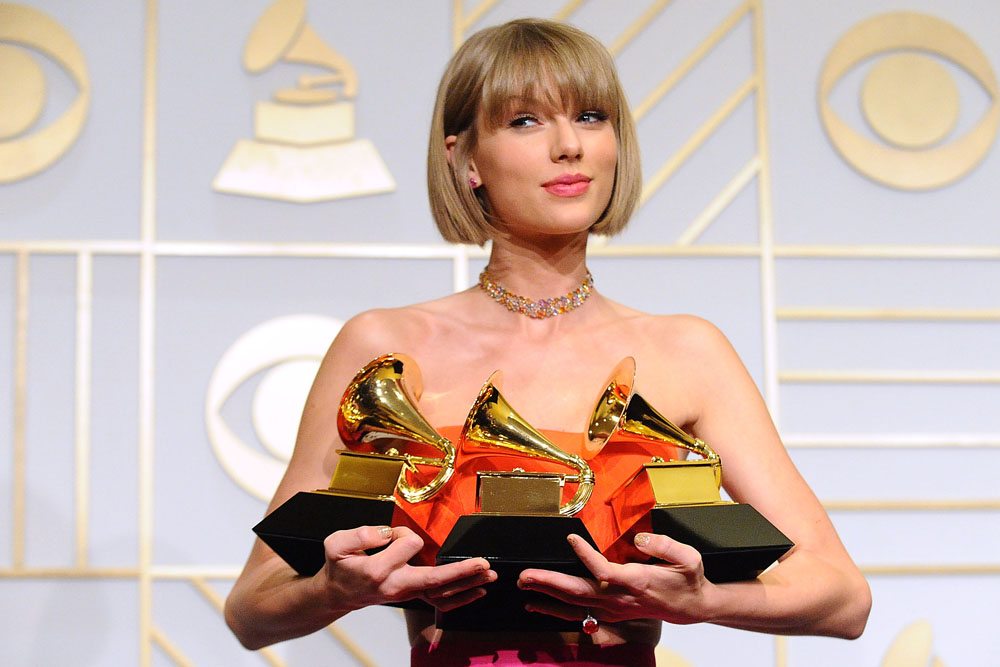It was only a matter of time. After ten years, five albums, a successful crossover from country darling to stadium-pop behemoth, four Rolling Stone covers, literal armfuls of Grammys, three films, 40-plus celebrity-packed shows, and a squad of girlfriends that would intimidate Regina George and all three Heathers, Taylor Swift, music’s starry-eyed everygirl, appears to have met her downfall in the form of a chopped-up, three-minute Snapchat video. For the time being, anyway.
There’s little doubt that Swift could have handled Kanye West’s “Famous” rollout better. When the track initially dropped back in February, with West tweeting that he’d run the controversial line “I feel like Taylor and I might still have sex / Why? I made that bitch famous” by the 1989 singer, she could have been more forthcoming in her response. Instead, her team stuck to their own — to use Swift’s new favorite word — narrative, insisting that “[Swift] declined [the offer to release ‘Famous’ on her Twitter account] and cautioned [Kanye] about releasing a song with such a strong misogynistic message.”
But as we’ve seen this week, Swift clearly — if not a little hesitantly — was on board with the copulation-themed lyric: According to Kim Kardashian West’s directorial debut, Swift told Kanye over the phone — after he had apparently read the line to her — “It’s, like, a compliment, kind of.” (Have surer words ever been spoken than “kind of?”) If, when the song first made the rounds, she had clarified to the public what she did and did not know from the start (namely, whether she had been notified of the line beforehand and whether she was aware that ‘Ye would be calling her “that bitch”), and skipped the scolding subtweet on the Grammys stage, she might’ve saved herself some agony. But say there had been no video reveal: Swift would probably have taken a football to the face eventually, and everyone would’ve loved it.

Also Read
Choppered and Tuned
We’ve been trained since 2006 to view Swift as the underdog. She’s the same woman who wrote dark-horse ballads like “Teardrops on My Guitar” and “You Belong With Me” — songs that cast Swift as the little-seen girl next door, the “one that understands you,” as opposed to some vapid cheerleader archetype who “doesn’t know your story like I do.” She’s the same woman who patented the “Award Show Surprise Face,” bugging out her eyes and clasping her hands to her mouth with every win as if she was just a pity nomination. But as the years elapsed, Swift has slowly-but-surely morphed into a Popular Girl with with an impenetrable veneer — maybe not exactly the sort of glamazon that hip-checks you and only wears pink on Wednesdays, but one who’s dropped the guileless Nashville accent (not to mention the area code, as we learned from her Kanye phone call), traded pleated skirts for leather bodysuits and black lipstick, and made a real point of documenting her time with the Who’s Who of the fashion, film, and music realms. Maybe this was who she was all along, and maybe that’s why we’re so quick to accuse her of being insincere.
https://youtube.com/watch?v=xPOPtQIEQt0
Swift has evolved into the music industry’s Marcia Brady: the flawless, model-like, all-American golden child. A decade’s worth of overexposure to Taylor’s particular brand of exquisiteness — not to mention her highly marketable doe-eyed wholesomeness, made complete by an Instagram overflowing with Pinterest-perfect parties, Scottish Fold kitties, and homemade baked goods — forces onlookers to regard themselves as Jan: the middle Brady daughter who still has plenty to offer, but is less outwardly remarkable than her radiant sibling. No wonder people get bothered. Perfection is annoying.
But as much as good old-fashioned envy and celebrity schadenfreude ties into our readiness for Swift’s upheaval, her current predicament is not without a note of gender-specific, be-nice expectation: When Kanye West calls someone a “bitch” in a song, we decide, as his wife argued in GQ, that “it’s just what they say” — the “they” in question meaning male members of the hip-hop community. And when Kanye makes fun of Wiz Khalifa’s pants and takes shots at Khalifa’s toddler son on Twitter, then highlights a years-old feud with Swift in the lyrics to “Famous,” he’s just being plainspoken. Direct. The same guy who once called out the President on TV for ignoring the plight of Hurricane Katrina victims. Someone who hosts thousands of fans at Madison Square Garden listening parties while Swift is safely tucked away somewhere on the rocky coast of Rhode Island, probably baking cupcakes with one of her many prominent companions.
But when Swift (allegedly) refers to old tensions with Perry in the lyrics to “Bad Blood,” she’s a Mean Girl. A “burier.” Someone who deserves to have ex-boyfriend Calvin Harris rant at her on Twitter (he looks to be recovering from their split just fine, by the way). And should Swift decide to array some Famous Friends in a blockbuster music video, we decree that she’s Not Being Feminist Enough because she’s essentially pitting women against other women (assuming that “Bad Blood” is, in fact, about Katy Perry). Also, Swift has too many big-league cohorts, and isn’t that just sooo fake?
Kanye’s got friends in high places, too. He paraded every last Kardashian (plus a Jenner or two) at his MSG Life of Pablo reveal, plus Vogue Editor-in-Chief Anna Wintour, Naomi Cambell, the Hadid sisters, and Jay Z. And that’s not even counting the squad by his side as he lorded over the aux cord: Kid Cudi, Big Sean, 2 Chainz, Pusha T, Chance the Rapper, Vic Mensa, Tyga, and A$AP Rocky.
These two perpetually in-conflict personalities are not without their similarities, despite the different ways they execute fame. But where Kanye gets to be the people’s champ because of his Twitter rants, promises to run for President (Kanye 2020!), random solicitations for cash, and an almost Trump-like ability to turn insults and unfiltered diatribes into galvanizing entertainment, Swift’s persona is regarded as too controlled, too calculated. She can’t win, though; imagine the backlash if she acted half as impromptu (if we could even believe her being impromptu). There’s a reason that the saying “too good to be true” exists — it’s because we (correctly) assume that anyone or anything that’s seemingly immaculate must actually be secretly corrupt. And when we learn that they are less than perfect, we relish in our personal victory.
And yet, one glaring PR misstep — two, if you count last year’s teachable moment in white feminism with Nicki Minaj — does not and should not undo ten years of personal and professional victory. Seeing as the internet has the memory of a goldfish, Swift can rest easy in the knowledge that this, too, shall pass. But while we still revel in the Pop Princess’ stumble, it’s worth taking a longer look at ourselves and our own desire for Swift to slip on the ice. Maybe, after years of trying to force the impression that she’s Just Like Us (she bakes! She plays with pets! She gets her heart broken!), Swift has at last sunk to our imperfect level. Now that she’s been humbled, hopefully we’ll spend less time wishing to see a ding in Swift’s armor and more time remembering the myriad reasons why we loved her music in the first place.




